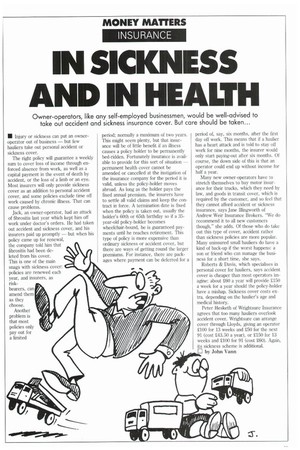IN SICKNESS AND IN HEALT
Page 69

If you've noticed an error in this article please click here to report it so we can fix it.
Owner-operators, like any self-employed businessmen, would be well-advised to take out accident and sickness insurance cover. But care should be taken...
III Injury or sickness can put an owneroperator out of business — but few hauliers take out personal accident or sickness cover.
The right policy will guarantee a weekly sum to cover loss of income through enforced absence from work, as well as a capital payment in the event of death by accident, or the loss of a limb or an eye. Most insurers will only provide sickness cover as an addition to personal accident cover, and some policies exclude time off work caused by chronic illness. That can cause problems.
Jack, an owner-operator, had an attack of fibrositis last year which kept him off work under doctor's orders. He had taken out accident and sickness cover, and his insurers paid up promptly — but when his policy came up for renewal, the company told him that fibrositis had been deleted from his cover. This is one of the main snags with sickness cover: policies are renewed each year, and insurers, as riskbearers, can amend them as they choose.
Another problem is that most policies only pay out for a limited period; normally a maximum of two years. This might seem plenty, but that insurance will be of little benefit if an illness causes a policy holder to be permanently bed-ridden, Fortunately insurance is available to provide for this sort of situation — permanent health cover cannot be amended or cancelled at the instigation of the insurance company for the period it is valid, unless the policy-holder moves abroad. As long as the holder pays the fixed annual premium, the insurers have to settle all valid claims and keep the contract in force. A termination date is fixed when the policy is taken out, usually the holder's 60th or 65th birthday so if a 35year-old policy-holder becomes wheelchair-bound, he is guaranteed payments until he reaches retirement. This type of policy is more expensive than ordinary sickness or accident cover, but there are ways of getting round the larger premiums. For instance, there are packages where payment can be deferred for a period of, say, six months, after the first day off work. This means that if a haulier has a heart attack and is told to stay off work for nine months, the insurer would only start paying-out after six months. Of course, the down side of this is that an operator could end up without income for half a year.
Many new owner-operators have to stretch themselves to buy motor insurance for their trucks, which they need by law, and goods in transit cover, which is required by the customer, and so feel that they cannot afford accident or sickness insurance, says Jane Illingworth of Andrew Weir Insurance Brokers. "We do recommend it to all new customers though," she adds. Of those who do take out this type of cover, accident rather than sickness policies are more popular. Many uninsured small hauliers do have a kind of back-up if the worst happens: a son or friend who can manage the business for a short time, she says.
Roberts & Davis, which specialises in personal cover for hauliers, says accident cover is cheaper than most operators imagine: about £60 a year will provide £150 a week for a year should the policy-holder have a mishap. Sickness cover costs extra, depending on the haulier's age and medical history.
Peter Hesketh of Wrightsure Insurance agrees that too many hauliers overlook accident cover. Wright sure can arrange cover through Lloyds, giving an operator .2100 for 13 weeks and £50 for the next 91 (cost £43.50 a year), or £150 for 13 weeks and £100 for 91 (cost £60), Again, its sickness scheme is additional.
by John Vann
























































































































































